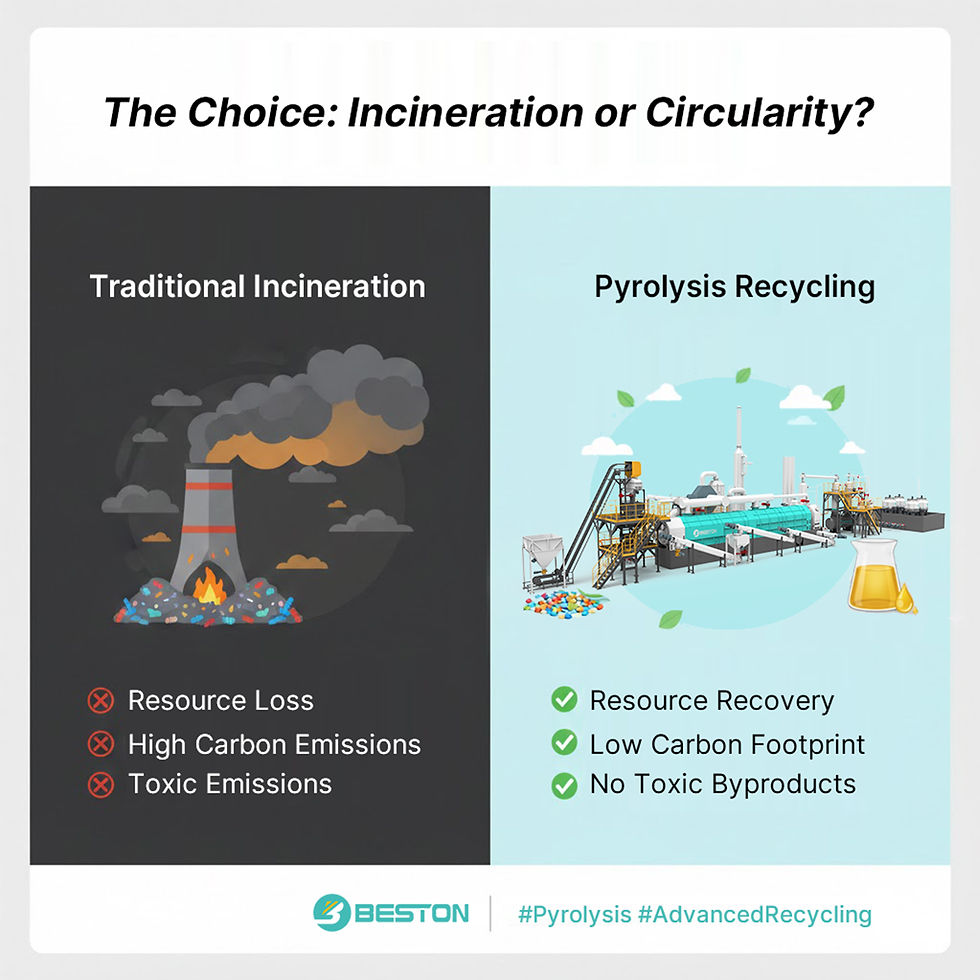Plastic to Fuel: A Clean Energy Future
- lee784287
- 2025年6月23日
- 讀畢需時 3 分鐘
As the world grapples with the growing plastic waste crisis, innovative solutions are emerging that promise to transform this environmental challenge into an opportunity for clean energy production. One of the most promising advancements is the plastic-to-fuel technology, which aims to convert plastic waste into usable fuel, offering a dual benefit of addressing waste disposal and providing sustainable energy. In this blog post, we’ll explore how this technology works, its potential benefits, and how it contributes to a cleaner, more sustainable future.

What is Plastic-to-Fuel Technology?
Plastic to fuel machine uses a process called pyrolysis to break down plastic waste into usable fuels such as diesel, gasoline, and kerosene. During pyrolysis, plastics are heated in the absence of oxygen, causing them to decompose into smaller molecules. These molecules are then condensed into liquid fuel, which can be used as an energy source.
This technology is particularly valuable because it can convert plastic waste, which would otherwise end up in landfills or oceans, into clean, sustainable energy. The process does not require oxygen, reducing the emission of harmful pollutants like CO2 and methane, making it a more eco-friendly solution compared to traditional waste disposal methods.
The Environmental Benefits
Waste Reduction: The most immediate benefit of plastic-to-fuel technology is the reduction of plastic waste. With millions of tons of plastic being produced every year, much of it ending up in landfills or the ocean, converting plastic into fuel offers a practical way to reduce waste and minimize environmental pollution.
Sustainable Energy Production: The fuel produced from plastic waste can be used to generate electricity or power vehicles, reducing reliance on fossil fuels. This renewable energy source could play a vital role in transitioning to a more sustainable energy future.
Lower Carbon Footprint: Unlike traditional plastic incineration, which emits harmful gases and contributes to global warming, the pyrolysis process is cleaner, emitting fewer greenhouse gases. In fact, some systems capture and reuse the gases produced during pyrolysis to generate energy, further reducing carbon emissions.
Supporting a Circular Economy: Plastic-to-fuel technology is aligned with the principles of a circular economy, where waste materials are continuously repurposed into new products. This approach reduces the need for new raw materials and minimizes waste, contributing to the overall sustainability of industries that rely heavily on plastics.
The Potential for Large-Scale Implementation
While the concept of converting plastic to fuel holds great promise, its large-scale implementation still faces challenges. The technology is still in the early stages of development, and there are questions around economics, scalability, and regulatory approval. However, with increasing investment in the sector, and as the demand for alternative energy sources grows, plastic-to-fuel systems are expected to become more cost-competitive and accessible.
Several companies have already begun developing pilot plants that demonstrate the feasibility of this technology. These plants not only process plastic waste into fuel but also create local jobs and contribute to the local economy by providing a renewable energy source for communities.
Looking to the Future
The plastic-to-fuel technology represents a transformative shift in how we think about waste and energy. By turning plastic waste into valuable fuel, we can reduce landfill waste, cut down on ocean pollution, and contribute to a more sustainable energy future. As the technology continues to evolve, it holds the potential to become an integral part of a broader strategy to address both environmental and energy challenges on a global scale.
In a world where plastic pollution is one of the most pressing environmental issues, plastic-to-fuel technology offers a beacon of hope, providing a cleaner, more sustainable way to manage waste and produce energy. The future of energy could very well be shaped by how we manage our plastic waste today.
Conclusion
Plastic-to-fuel technology is not just about converting waste into energy—it's about creating a future where waste is no longer something to discard, but a valuable resource that can be repurposed for the betterment of the planet. As innovation in this field continues to advance, it could play a significant role in reducing plastic pollution and shifting the world toward a more sustainable, clean energy future. The journey to a cleaner, greener planet starts with the way we treat our waste—transforming plastic into fuel is just one powerful step in the right direction.



留言